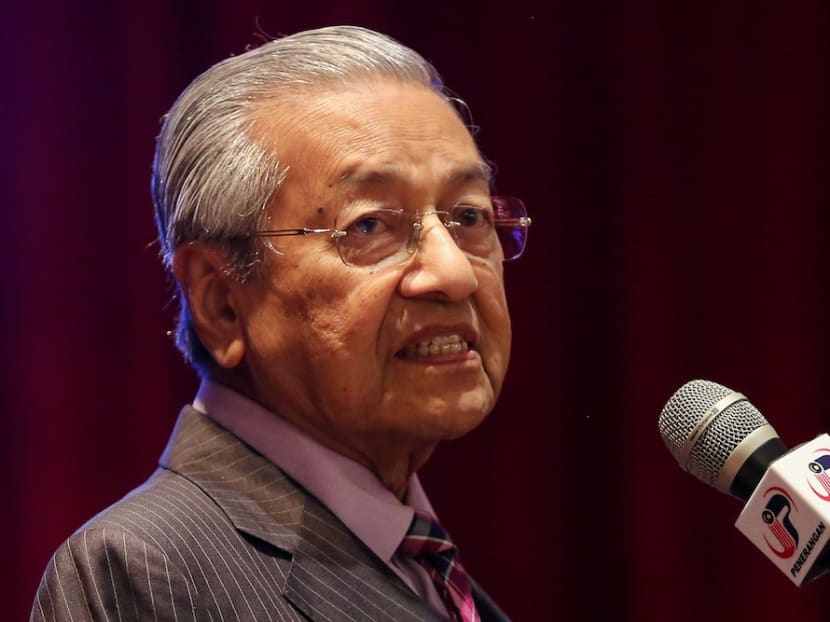Mahathir tells Malaysia’s Malay-Muslims to ‘work harder’
KUALA LUMPUR — Just days before a mega-rally organised by Malaysia’s race- and religion-based opposition parties, Prime Minister Mahathir Mohamad has launched a blistering salvo against the ethnic Malay-Muslim community, calling on them to “work harder” to achieve success rather than merely getting angry at others.
KUALA LUMPUR — Just days before a mega-rally organised by Malaysia’s race- and religion-based opposition parties, Prime Minister Mahathir Mohamad has launched a blistering salvo against the ethnic Malay-Muslim community, calling on them to “work harder” to achieve success rather than merely getting angry at others.
In a blog post on Friday (Sept 6), Dr Mahathir said Malays — who form the bulk of Malaysia’s multi-ethnic electorate — “still refuse to work”.
“Malays should realise what is happening to them. Unfortunately, they have not realised. They still refuse to work. The Malays would surrender all jobs to foreigners," he wrote.
"Foreigners have flooded our country. Seven million foreigners are still here. They work. What will happen to the Malays?”
Malaysia’s population is around 31 million.
Dr Mahathir, who also served as prime minister from 1981 to 2003, has long railed against what he perceives as the Malay community’s lack of drive. During his first stint as prime minister, he pushed for the country’s industrialisation and fiercely promoted race-based affirmative action policies aimed at reducing socioeconomic inequality between the Malays and other races in Malaysia, which include ethnic Chinese and Indians.
“Our fate is in our own hands. Getting angry with other people will not solve our problems … Because [Malays] were not willing to work hard, to do business seriously, they remained poor,” wrote Dr Mahathir, who returned to power in last year’s general election.
Dr Mahathir’s remarks come amid rising racial tensions over issues such a perceived pro-Islamic bias in public education, the presence of a controversial Indian Muslim preacher, and a campaign to boycott ‘non-Muslim’ products by social media groups that have garnered hundreds of thousands of members.
While non-Malays accuse the government of pandering to Malay voters, Malays question whether it can continue to safeguard their privileges, which are enshrined in the constitution.
“His statement was made to give the ethnic Chinese a better understanding of the Malays’ weak position in the economy, and to send the message that Malays’ ability to boycott others is still limited as they are reliant on other ethnicities when it comes to the economy,” said political scientist Awang Azman of University Malaya’s Institute of Malay Studies.
Government leaders – including Dr Mahathir and deputy prime minister Wan Azizah Wan Ismail — have urged Malaysians to ignore all calls for a race-based boycott and instead focus on supporting local businesses.
As Dr Mahathir’s Pakatan Harapan coalition struggles to secure the Malay community’s support — it won the last election with less than 30 per cent of the Malay vote — right-wing race and religion-based opposition parties have capitalised. The United Malays National Organisation (Umno), which led Malaysia for over 60 years, and Parti Islam Se-Malaysia (PAS) are teaming up, and making their partnership official with a two-day mega-rally slated to end on September 14, just two days before Malaysia Day.
Already, opposition members have latched onto Dr Mahathir’s remarks as proof of his inability to defend the community, accusing him of “ridiculing” Malays.
“To make a nation prosper comes down to good policy formulation, good education, and effective implementation,” said Umno leader Razlan Rafii.
But political risk analyst Amir Fareed Rahim of KRA Group said Dr Mahathir’s remarks were nothing new. He said they were in line with themes Dr Mahathir has returned to throughout his public career, specifically that Malays, who make up over 60 per cent of Malaysia’s demographic, need to lift themselves economically through hard work.
“The prime minister has been travelling abroad extensively over the past few weeks. He has been seeing and listening to the experiences, issues and challenges facing them," said Mr Amir.
"Therefore, he must have had time to reflect on Malaysia’s own economic problems and how, to his mind, it is lagging behind its neighbours. His frustrations with what he sees as the behavioural problems of the community may also be coming to the fore as he seeks to push through as much reform as he can in the time he has left.”
But while Dr Mahathir’s message — and staunch credentials as a Malay nationalist — remains consistent, it may not resonate the way it did in the 1980s and 1990s.
“Some Malays may resent what they see as his lecturing them to work hard, when the reality is that the country’s low-wage growth model may not be the way forward for it economically. Some may feel that they have been taking his advice all this while – but have little to show for it,” Mr Amir said. SOUTH CHINA MORNING POST







